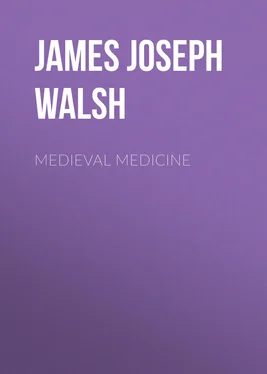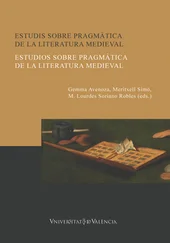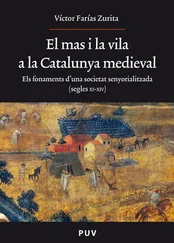James Walsh - Medieval Medicine
Здесь есть возможность читать онлайн «James Walsh - Medieval Medicine» — ознакомительный отрывок электронной книги совершенно бесплатно, а после прочтения отрывка купить полную версию. В некоторых случаях можно слушать аудио, скачать через торрент в формате fb2 и присутствует краткое содержание. Жанр: foreign_prose, Медицина, foreign_antique, на английском языке. Описание произведения, (предисловие) а так же отзывы посетителей доступны на портале библиотеки ЛибКат.
- Название:Medieval Medicine
- Автор:
- Жанр:
- Год:неизвестен
- ISBN:нет данных
- Рейтинг книги:3 / 5. Голосов: 1
-
Избранное:Добавить в избранное
- Отзывы:
-
Ваша оценка:
- 60
- 1
- 2
- 3
- 4
- 5
Medieval Medicine: краткое содержание, описание и аннотация
Предлагаем к чтению аннотацию, описание, краткое содержание или предисловие (зависит от того, что написал сам автор книги «Medieval Medicine»). Если вы не нашли необходимую информацию о книге — напишите в комментариях, мы постараемся отыскать её.
Medieval Medicine — читать онлайн ознакомительный отрывок
Ниже представлен текст книги, разбитый по страницам. Система сохранения места последней прочитанной страницы, позволяет с удобством читать онлайн бесплатно книгу «Medieval Medicine», без необходимости каждый раз заново искать на чём Вы остановились. Поставьте закладку, и сможете в любой момент перейти на страницу, на которой закончили чтение.
Интервал:
Закладка:
In his “Storia della Medicina in Italia,” published so modestly at Naples, the patient Italian student of medical history made an epoch-making contribution to the history of medicine. Unless one has actually read his book, it is difficult to understand how deep our obligations to him are. Anyone who might be tempted to think that medicine was not taken seriously, or that careful clinical observations and serious experiments for the cure of disease were not made at Salerno, will be amply undeceived by a reading of De Renzi. Above all, he makes it very clear that medical education was taken up with rigorous attention to details and high standards maintained. Three years of college work were demanded in preparation for medical studies, and then four years at medicine, followed by a year of practice with a physician, and even an additional year of special study in anatomy, had to be taken, if surgery were to be practised. All this before the licence to practise medicine was given; though the degree of doctor, granting the privilege of teaching as the word indicates, was conferred apparently after the completion of the four years at the medical school. We have had to climb back to these medieval standards of medical education in many countries in recent years, after a period of deterioration in which often the requirements for the physician’s training for practice were ever so much lower.
It may seem surprising that the first medical school should have arisen in the southern part of Italy, but for those who know the historical conditions it will seem the most natural thing in the world that this development should have come in this region. As we have said, touch with Greek has always been the most important factor for modern educational and intellectual development. Salerno was situated in the heart of that Greek colony in the southern part of Italy which came to be known as Magna Græcia. Apparently at no time during the Middle Ages was Greek entirely a dead language in this part of Italy, and there were Greek travellers, Greek sailors, and many other wanderers, who made their way along the shores of the Mediterranean at this time, and carried with them everywhere the stimulus that always came from association with the Greeks of Asia Minor and of the Grecian Islands and peninsula.
There were two other factors that made for the development of the medical school at Salerno. The first of these seems undoubtedly to have been the presence of the Benedictines, who had a rather important school at Salerno, and who were closely in touch with their great mother-house at Monte Cassino not far away. It was they who imparted the academic atmosphere to the town, and made it possible to gather together the elements for the university which gradually came into existence around the medical school, after that began to attract European attention.
The actual foundation of the medical school, however, seems to have been due to the fortunate accident that Salerno became a health resort, a place to which invalids were attracted from many parts of Europe because the climate was salubrious, and opportunities for obtaining the medical advice of men of many different schools of thought from all over the Mediterranean, and securing the Oriental drugs which were so much valued—as drugs from a distance always are—were there afforded. It is easy to understand that, especially in the winter-time, better-class patients from all over Europe would be glad to go down to the mild temperate climate of Salerno and spend their time there.
It has been pointed out that the first modern university, that of Salerno, had for a nucleus a medical school, representing man’s interest in his body as his primary intellectual purpose in modern history. The second modern university, that of Bologna, gathered around a law school representing man’s interest in his property—his second formal purpose in life. And the third, that of Paris, developed around a school of theology and philosophy, demonstrating that man’s intellectual interests rise finally to the consideration of his relations to his fellow-man and to God.
The first that we know definitely about the medical school of Salerno, the origin of which is difficult to trace, is concerned with Alphanus, usually designated “the First,” because there are several of the name. He was a Benedictine monk, distinguished as a literary man and known by his contemporaries as both poet and physician, who was afterwards raised to the Bishopric of Salerno. He had taught at Salerno in the Benedictine school there before becoming Bishop, and when exercising the highest ecclesiastical authority did much to encourage the development of Salerno. He states that medicine flourished in the town even in the ninth century, and there is an old chronicle published by De Renzi in his “Collectio Salernitana” in which it is said that the medical school was founded by four doctors—a Jewish Rabbi, Elinus; a Greek, Pontus; a Saracen, Adale; and the fourth a native of Salerno—each of whom lectured in his native language. This reads like a mythical legend that has formed around some real tradition of the coming of physicians from many countries. Puschmann in his “History of Medical Education” has suggested that the names are probably as much varied as the absolute truth of the facts. Elinus, the Jew, is probably Elias or Eliseus, Adale is probably a corruption of Abdallah, and Pontus should be probably Gariopontus.
There was a hospital at Salerno that was somewhat famous as early as the first quarter of the ninth century. This was placed under the control of the Benedictines; and other infirmaries and charitable institutions, similarly under the care of religious orders, sprang up in Salerno to accommodate the patients that came. The practical character of the teaching at Salerno, as preserved for us in the writings of the school, would seem to argue that probably those who came to study medicine here were brought directly in contact with the patients, though we have no definite evidence of that fact.
The most interesting feature of the medical school at Salerno is undoubtedly the development of legal standards of medical education in connection with the school. Before the middle of the twelfth century Roger, King of the Two Sicilies, issued a decree according to which preliminary studies at the University were required as a preparation for the medical school, and four years of medical studies were made the minimum requirement for the degree of doctor in medicine, which was, however, as we have said, not a licence to practise, but only a certificate authorizing teaching. There seemed to have been, even thus early, some further state regulations with regard to practice. About the middle of the next century, however, there came, through a law of the Emperor Frederick II., a still further evolution of legal standards for medical education and medical practice in the Two Sicilies. This law required that the student of medicine should have spent some years, probably the equivalent of our undergraduate training, in the university before studying medicine, and that he should then devote four years to medicine, after which, on proper examination, he might be given the degree of doctor—that is, teacher of medicine; but he must spend a further year of practice with a physician before he would be allowed to practise for himself.
This is such a high standard that, only that we have the actual wording of the law, it would seem almost impossible that it could have been evolved at this period in medical history. It actually represents the standard that we have climbed back to generally only during the past generation or two, and in the interval there have been many rather serious derogations from it. This law of the Emperor Frederick is, moreover, a pure drug law, regulating the sale of drugs and their purity, and inflicting condign punishment for substitution; in this regard also anticipating our most recent well-considered legislation. The penalty by which the druggist was fined all his movable goods for substitution, while the government inspector who permitted such substitution was put to death, would seem to us in the modern time to make the punishment eminently fit the crime. Almost needless to say, then, the law (see Appendix for full text) represents one of the most important documents in the history of medicine, particularly of medical education. The fee regulation included in it shows that medicine was looked upon as a profession, and was paid accordingly.
Читать дальшеИнтервал:
Закладка:
Похожие книги на «Medieval Medicine»
Представляем Вашему вниманию похожие книги на «Medieval Medicine» списком для выбора. Мы отобрали схожую по названию и смыслу литературу в надежде предоставить читателям больше вариантов отыскать новые, интересные, ещё непрочитанные произведения.
Обсуждение, отзывы о книге «Medieval Medicine» и просто собственные мнения читателей. Оставьте ваши комментарии, напишите, что Вы думаете о произведении, его смысле или главных героях. Укажите что конкретно понравилось, а что нет, и почему Вы так считаете.












